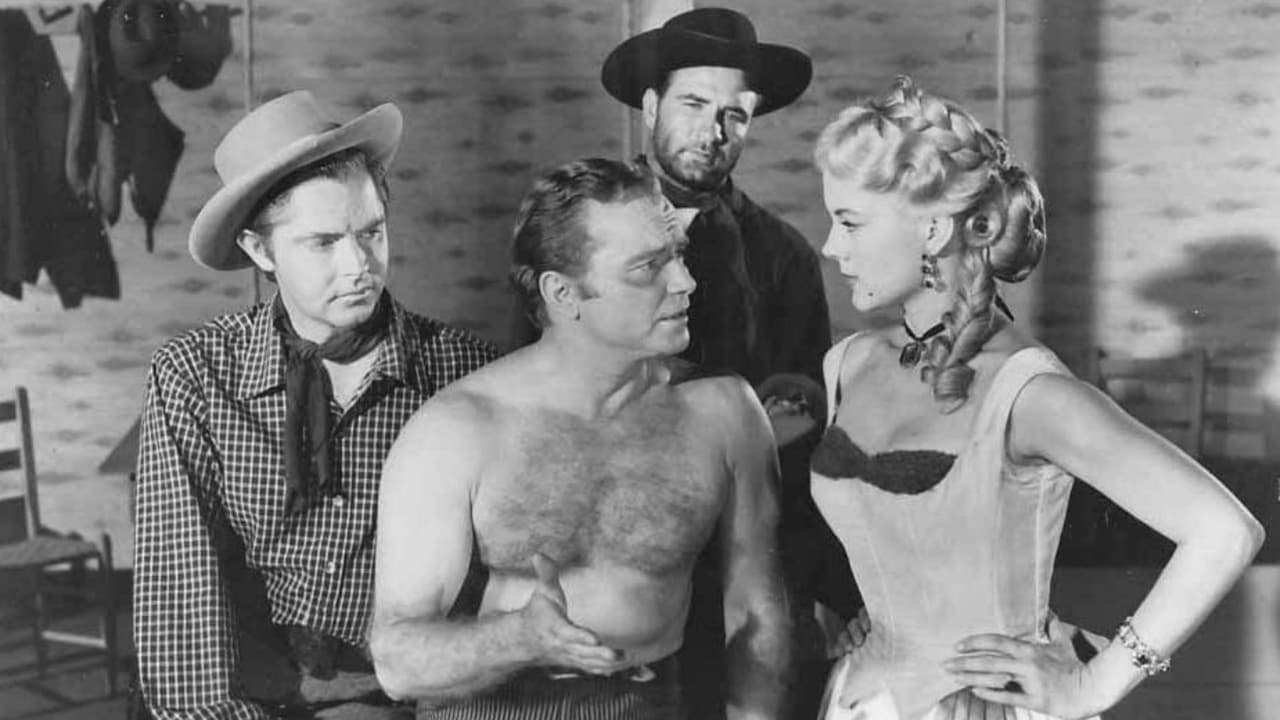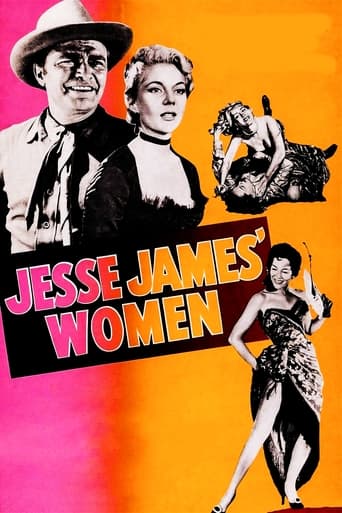Linbeymusol
Wonderful character development!
CrawlerChunky
In truth, there is barely enough story here to make a film.
Kirandeep Yoder
The joyful confection is coated in a sparkly gloss, bright enough to gleam from the darkest, most cynical corners.
Walter Sloane
Mostly, the movie is committed to the value of a good time.
classicsoncall
Well somewhere, some time, someone must have thought this was a good idea for a Western film treatment. Instead of terrorizing banks and stagecoaches, Jesse James (Don Barry) turns into a Don Juan and uses his dubious charms to romance a passel of gals out of their money. I guess since the title states "Jesses James' Women", there had to be a bunch of them, and so there was. Peggie Castle led the cast here as Golden Bell saloon gal Waco Gans, conducting a reasonable tryout for her 'Lawman' TV series run as Lily Merrill. Castle takes part in two of the picture's highlights - a knock down, drag out catfight with Betty Brueck, and later on an actual gunfight showdown with the same opponent going by Cattle Kate Kennedy. That one was a bit of a let down to my thinking, but still a creative effort on the part of the principals.The other contenders for Jesse James' affection include Lita Baron as saloon singer Delta, and Joyce Barrett as Caprice Clark. Probably outshining them all just by her sheer innocence was the sheriff's daughter Angel, winsomely played by Laura Lea, who managed to get the outlaw Jesse to show his human side. Ironically, they had their final conversation right in front of a wanted Poster offering ten thousand dollars for Jesse and his gang.For a quick change of pace, there's also a nifty boxing sequence in the latter half in which Jesse attempts to pull off a thousand dollar payday against barnstorming boxer Champ O'Toole (Alton Hillman). Not to be outdone by a resounding knockout, Jesse simply decides to rob the champ's entourage as they head out of town the next day. I guess if you want something offbeat and don't mind tampering with your Western outlaw legends, this could fit the bill. Just don't raise your expectations too high and you'll probably be OK.
Michael Morrison
Don Barry was a heck of an actor; he probably could have been a good director, with a better script and a bigger budget.As it was, he showed some inventiveness with camera angles in this generally not very good movie.The title could be rather off-putting, sounding like some kind of exploitation film. As it turned out, the title actually made sense, or at least as much sense as the story could provide.Peggie Castle was lovely, and actually quite good in a role that could have been ruinous if played differently.Some of the cast members seemed to have been recruited from bystanders, but ultimately most of them did as well as they could with the script.Jack Buetel showed he could perform and should be known as more than Jane Russell's leading man in "The Outlaw." Several others did little or nothing other than this film, but one, Mac McAllister, showed enough professionalism and personality I think it's a shame he didn't do more.In some ways this is a standard Western, but the saloon brawl was definitely non-stereotypical. If you see this film, be sure to pay attention to the sheriff during the fight.My copy of this film is a DVD in Volume 36 of The Great American Western series from Echo Bridge Home Entertainment. It is not a very good quality picture, and, in too many places, the film was broken and spliced resulting in a jumpiness.Still, all in all, this is a movie for Western fans and Don Barry fans to see at least once.Added 18 July 2015: There are now some versions available at YouTube.com. Maybe at least one will be better quality.
cindy-hillman
Al Hillman is Champ O'Toole, not Clem Botts the Sheriff. Please check credits on film. Al Hillman died in 1965 at age 42 from cancer. In his memory, please correct the misprint on the IMDb profile. He did not play the role of the sheriff, but was the colorful boxer, Champ O'Toole, and this can be verified by the credits on the film itself. I found the movie to be fun and full of mischief. The Mississippi setting gives the film an authentic feel for the nature of the far from plush lifestyle of outlaws on the run. The female stars are vivacious and did not mind letting go of their vanity for a little cat fight, which in the 1950's was brazen!
Gary R. Peterson
What a fun film this turned out to be! I stumbled on it hidden away on Platinum's Great American Western DVD Volume 36. JESSE JAMES' WOMEN was Dan "Red" Barry's magnum opus, the one film that he wrote, produced, directed and starred in.I'll admit up front that I'm weak on the real story of Jesse James and the Youngers, so can't say how much of this is fact or fiction. One point of history does come up when someone asks about the train robbery in "Adair, Ioway." This hold-up on July 21, 1873 was indeed the first train robbery west of the Mississippi River and there's a monument to it along Highway 6 just southwest of Adair (about 50 miles west of Des Moines).Barry's is the white-washed Jesse James of legend; in fact I was reminded of the BRADY BUNCH episode where Bobby idolizes Jesse and learns the hard way that he is not the stuff of heroes. Barry's Jesse knows that and anticipates that sitcom's message here when he meets the young girl Angel, who's hero is Jesse James. Little does she know she has befriended him in his incognito guise of Jay Woodsen (Woodson being Jesse's real life middle name). But despite his telling Angel to find another hero, Red Barry's Jesse James is one you could almost idolize in good conscience. He's a lovable rogue who charms multiple beautiful women and who like Robin Hood shares his spoils with those oppressed by the town plutocrat Banker Clark, who berates the hapless sheriff and who is too stingy to give the church he attends a loan for needed repairs. James' beneficence will allow the Sheriff to live his dream of retiring on a ranch and on his way out of town he even stops by the church to give the poor parson a bag of money.The film seems to end with the James Gang riding off to new exploits, but there's suddenly splashed on the screen an 1882 newspaper front-page announcing that Jesse James was shot in the back by Bob Ford. Then we see Angel and her siblings heading into church (I guess she took her hero's advice to seek the parson's counsel on establishing a new hero). I wondered if this ending was tacked on to get the film approved. After all, the James Gang did get away with an awful lot of loot here with no comeuppance, which could leave impressionable young moviegoers with the notion that crime does pay (and that being a baddie is a babe magnet).Red Barry had a big ego, was difficult to work with and thus he saw his star fall in the fifties to where he was doing low-budget films. JESSE JAMES' WOMEN was a low budget picture, but I think it holds its own against the bigger budget pictures of its time, like the Warner Bros. westerns Randolph Scott was churning out in the mid-fifties. Yes, most of the cast were unknowns and in clicking on their names I see that for many this film was their only acting credit. It was disappointing, because I would have liked to have seen more work from Betty Brueck (Cattle Kate Kennedy), Al Hillman (Sheriff Botts) and especially Jimmy Hammons (Champ O'Toole) who really brought an infectious enthusiasm to his role.Another film that came to mind watching JESSE JAMES' WOMEN was TERROR IN A Texas TOWN, which is known for featuring an unorthodox gunfight. Barry's film was the first time I've ever seen two women square off for a gunfight, and it was very well done (even if ultimately anticlimactic). Waco Gans and Cattle Kate had already treated the audience to a rousing catfight earlier in the picture.What a fun movie and one well worth the five or six bucks these Platinum Great American Western packages cost. The color is bright, the picture crisp; the only detractions being the occasional missing frames and minor print damage. Dan Barry's JESSE JAMES' WOMEN is clearly a labor of love and dare I say more fun to watch than my hero John Wayne's similar labor THE ALAMO? A few closing thoughts as a P.S.: (1) It was interesting to see the dawn of photography and how James rightly saw it as a potential threat to outlaws like himself. (2) James' eventual killer Bob Ford is featured here as the disgruntled Judas of the gang. I wondered if he eventually teamed up with Delta, whose face after Jesse gave her a swift kick in the rear implied she was going to seek vengeance; and finally, (3) I suspect the naming of the bumbling but lovable Sheriff Clem Botts was inspired by the similarly bumbling but lovable Alexander Botts, the tractor salesman of many a fun Saturday Evening Post story.

